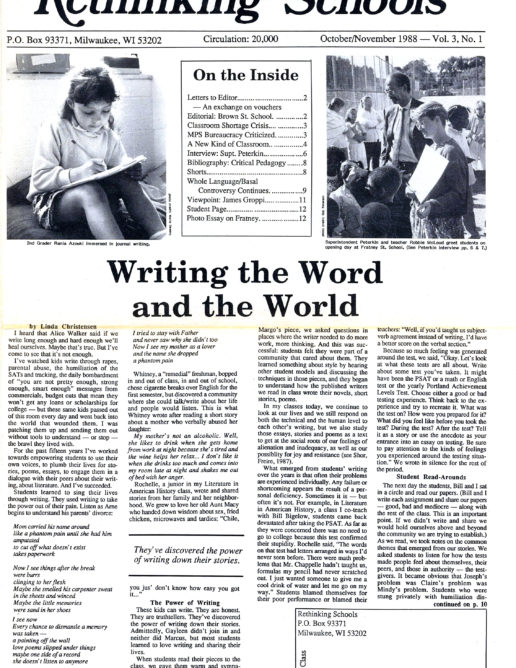MPS Bureaucracy Receives Criticism
Increasing concern has been expressed about the effectiveness of the Milwaukee Public Schools’ Central Office over the past few years. Recently some concrete proposals have put forth as possible remedies to some of the problems. One study, entitled Options for Organizing the Milwaukee Public Schools Final Report by the McKenzie Group, a private consultant group, was commissioned by the school board. The other study, entitled Management of Information was done by The Superintendent’s Committee to Increase the School System’s Efficiency and Responsiveness.
The McKenzie study has received attention in the press mainly because of its recommendation to break down MPS into four separate zones each run by its own superintendent. What the local press failed to emphasize was the rather harsh criticism leveled by the McKenzie group at the Central Office bureaucracy. The report stated that “there may be as many as six administrative layers between the schools and the superintendent” and that such a layered management structure… negatively influences communications, problem solving, and the accessibility of the school district’s leaders.”
The report also criticized “the separation of functions in the central office [which,] has at times, inhibited coordination and collaboration between divisions within the office.”
MPS staff development effort also came under fire. The report noted the “weak institutional linkage between the Curriculum m and Instruction or the Schools Services Divisions and the Staff Development Academy. Formal joint planning between these divisions does not occur….” Although the infamous “OBE” inservice fiasco was not mentioned by name, the report said, “With some exceptions, the staff development programs of the last two years tend to reflect a central office agenda, emphasizing large scale training programs for teachers and administrators…They have not focused on the individual school’s efforts to improve instruction or to bring about change in the achievement of minority students.”
Duplication of efforts was also criticised. Several r lated functions are spread out throughout different Central Office divisions and the “consequence of this are duplication of efforts, increased reporting requirements for the schools, and potentially increased costs.”
The second report, Management of Information, released in the spring of this years was authored by 17 individuals, including 10 principals, six Central Office personnel, and one program implementer. They attempted to collect a copy of every report that Central, Office requires of building principals. They compiled a list of 103 reports that must be submitted to CO during the year (some more than once) but added that ”This list is representative but in no way exhaustive!” Since that time one committee member said that the number now totals more than 150. Of the 13 Central Office divisions or departments which require reports, Administrative Services and Curriculum and Instruction lead in the number of required reports with 22 each.
Although couched in more timid language than the McKenzie report, the Superintendent’s Committee stated plainly that “Our historical administrative structures and policies which served us well in simpler times cannot provide the quality or timeliness of communication required in the current political reality. As a result parents and government agencies are frustrated in their efforts to relate to public schools.” The report did not examine the impact that such paperwork requirements had on the working conditions of teachers and learning conditions of students.
Perhaps most interesting was a follow up study to this report which was reported on at the July 15 meeting of a Marshall Plan Task Force subcommittee. After the various reports were compiled, a sampling of forms was randomly chosen and the information that they requested from the local schools was analyzed. It was found that 85% of the information requested was already available at Central Office, although perhaps in a division other than the one which produced the form.
The recommendations of the Superintendent’s Committee included calls for extensive reorganization and computerization and expansion of the data collection system within MPS. It also called for involvement of principals in planning the monthly principal’s meeting and incorporation of principals into the superintendent’s cabinet. No recommendations directly spoke to alleviating the paperwork tasks of classroom teachers.

